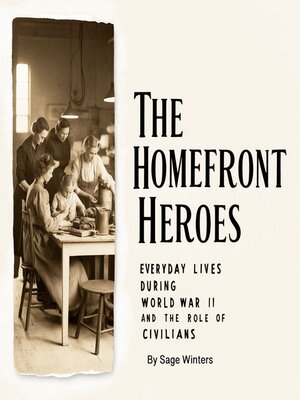The Homefront Heroes
audiobook (Unabridged) ∣ Everyday Lives during World War II and the Role of Civilians
By Sage Winters

Sign up to save your library
With an OverDrive account, you can save your favorite libraries for at-a-glance information about availability. Find out more about OverDrive accounts.
Find this title in Libby, the library reading app by OverDrive.



Search for a digital library with this title
Title found at these libraries:
| Library Name | Distance |
|---|---|
| Loading... |
The term "homefront" often evokes images of soldiers in trenches or aircraft soaring across the skies, but it is also a powerful representation of the unseen sacrifices and contributions made by civilians during times of war. During World War II, the homefront became an essential element in the overall war effort, with civilians across the world playing critical roles in supporting the troops and maintaining the stability of their countries. The efforts of everyday people—often invisible and uncelebrated—were foundational to both the immediate success of the war and the longer-term impact on society. This chapter delves into the importance of the homefront during WWII, exploring the diverse contributions of civilians, and highlighting how they collectively displayed a resilience that was vital for the war's outcome.
World War II was not just fought on foreign battlefields—it was waged in factories, schools, hospitals, and even neighborhoods. The efforts of civilians extended well beyond the provision of material goods. They also contributed by keeping national spirits high through solidarity and patriotism, showing an unyielding dedication to the cause despite the challenges at home. The mobilization of the homefront became a key factor in the Allied victory, and it transformed daily life in ways that would endure long after the war ended.
Women, for instance, took on roles that had traditionally been reserved for men, stepping into factories, shipyards, and offices, proving their capacity to contribute to industries critical to the war effort. At the same time, families managed with rationing and shortages while simultaneously participating in drives for scrap metal, rubber, and other materials that could be recycled for wartime use. Even children contributed in their own ways, collecting tin cans and engaging in other activities designed to support the war effort.







